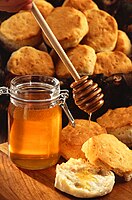
Photo from wikipedia
Abstract Various adulterations and thermal treatments applied to honey during or after production interfere with the natural structure of honey and reduce its nutritional value. In this study, three different… Click to show full abstract
Abstract Various adulterations and thermal treatments applied to honey during or after production interfere with the natural structure of honey and reduce its nutritional value. In this study, three different honey samples were adulterated with sucrose (sugar beet) syrup at the ratios of 0, 10, 20, 40, and 50% in weight to prepare adulterated honey samples. HPLC was used for the sugar analysis while an atomic absorption (AA) spectrophotometer was used for the potassium and sodium analyses, and other chemical and physical analyses were conducted on these adulterated honey samples. The PCA analysis results showed that the parameters analysed in this study can also be used in the analysis of adulterated honey. As a result, it was determined that some components of the samples that had been adulterated by the addition of sucrose at ratios as high as 50% may go out of the known variation ranges; in other words, they push the limits. An increase was found in the 5-hydroxymethylfurfural (HMF) amounts in the thermally treated samples while a reduction was observed in diastase activity. These results may be considered an indicator of the fact that honey has been heated.
Journal Title: Journal of Food Composition and Analysis
Year Published: 2021
Link to full text (if available)
Share on Social Media: Sign Up to like & get
recommendations!